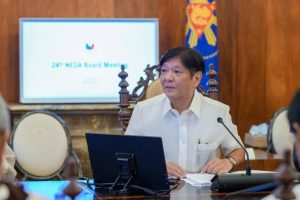Last week, Philippine President Ferdinand Marcos Jr. called out the petitioners against the 2025 budget for being part of a “destabilization” effort against his government.
Asked by the media about the Supreme Court petition questioning the constitutionality of the budget bill he signed in December, Marcos said that this could undermine government operations.
“We shut down everything. I guess that’s what they want. They want the government to cease working,” Marcos said. He added that petitioners are aligned with those behind attempts to destabilize his administration.
Among the petitioners was his former executive secretary who claimed that Marcos signed a bill containing blank pages. “We filed our petition to the Supreme Court to protect public funds from being disbursed illegally, prevent wastage of public money and people’s money being deflected to any improper use,” he said.
Reacting to the issue, former President Rodrigo Duterte said that the budget signing was anomalous. “You cannot pass a law with blanks,” he said. “It is not allowed by law. You cannot pass an incomplete appropriation or bill for that matter.”
Marcos insisted that there were no blank pages in the final budget document aside from accusing the former president of lying to the public about the controversy.
Marcos signed the budget bill before the end of 2024 amid protests from various stakeholders that it was bloated with pork barrel allocations intended to reward allies of the ruling party ahead of the midterm elections scheduled for May. In response to the uproar, Marcos vetoed some provisions and imposed conditions on the implementation of ayuda (relief or aid to the poor) programs to prevent them from being misused as a tool for political patronage and corruption.
The Dutertes, who are former allies of Marcos and a major bloc in the ruling coalition, have joined opposition groups in condemning the distorted priorities in the budget bill and worsening corruption in government. However, they lack credibility in espousing this advocacy since it is widely perceived that they are seeking to distract public attention and evade accountability for the questionable expenses made by Vice President Sara Duterte. Three impeachment complaints were filed against the vice president for the alleged misuse of her confidential funds in 2022 and 2023.
The intensified tension between the Marcos and Duterte forces was evident when the president mentioned the threat of destabilization. The term is often linked to coup and power grab activities. Did the president deliberately use the term to affirm the loyalty of state troops? In December 2024, former President Duterte exhorted the military and police to take action and address the “fractured governance” in the country.
Amid the continued infighting of political clans, Marcos removed Vice President Duterte and all former presidents from the National Security Council.
But citizen-led efforts to combat corruption should not be lumped with the partisan agenda of the Dutertes. Marcos is maliciously trying to muddle the issue by depicting the legitimate critique against the budget as a plot against his administration. He should recognize the growing public dissatisfaction about rising prices and inadequate delivery of social services.
The recent pastoral letter of the influential Catholic Bishops Conference of the Philippines reflects the popular indignation against corruption. An excerpt of the letter distributed to churches across the country raised this concern: “The questionable insertions, cuts, and adjustments in the national budget; and the anti-poverty programs that promote a culture of patronage and mendicancy are truly disturbing.”
Several anti-corruption protests were held last week decrying corruption and abuse of power in government. More protests are expected this month coinciding with the 1986 People Power anniversary that led to the ouster of the Marcos dictatorship.
The president cannot prevent people from pursuing accountability and transparency by denigrating this campaign as a destabilization plot. He risks losing popular support by ignoring the clamor for good governance.

































